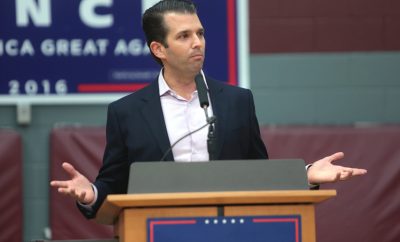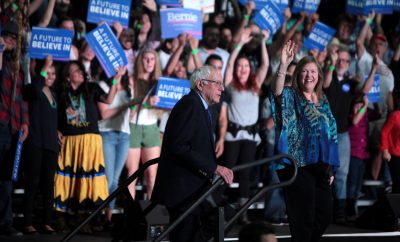 Image Courtesy of tsuna72; License: (CC BY 2.0)
Image Courtesy of tsuna72; License: (CC BY 2.0)
Politics
Trump Officially Pulls the U.S. from the Trans-Pacific Partnership
President Donald Trump made good on one of his campaign promises on Monday, signing an executive order to pull the U.S. from negotiations for the Trans-Pacific Partnership (TPP) trade deal. The deal, a 12-nation free trade agreement molded by President Obama but never introduced to Congress, was a lightning rod for anti-trade rhetoric throughout the campaign.
“We’ve been talking about this for a long time,” Trump said while signing the document to formally withdraw the U.S. from the pact. He added that his decision would be a “great thing for the American worker.”
Obama spent eight years pushing his signature trade achievement. Trump’s executive action dashes any chances of a U.S.-led free trade agreement in the Pacific region. It is also an abrupt change in Democratic and Republican orthodoxy, both of which prize global trade ties and U.S. leadership on the world stage. Trump is rebuking that decades-old mode of thinking.
During his Inaugural Address on Friday, Trump made his most recent promise to follow through on his “America first” ethos: “We must protect our borders from the ravages of other countries making our products, stealing our companies and destroying our jobs,” he said. “Protection will lead to great prosperity and strength.”
Dumping the TPP was not the only executive order Trump signed on Monday. He also froze federal hiring, excluding the military, and rolled back federal funding for non governmental organizations that work with organizations that perform abortions.
Up until the primary season, Obama, and many other lawmakers from both parties, thought the TPP would usher in a new era of U.S. economic leadership. The agreement featured some of the Pacific Rim’s largest economies, including Japan and Australia, and would have eliminated tariffs and provided a framework for solving trade disputes. It would have strengthened the fiscal ties of 12 countries that make up 40 percent of the world’s economy.
But then came Trump on the right, and Sen. Bernie Sanders (I-VT) on the left. Both tapped into an anti-globalization fervor that was gripping parts of the country, forcing Hillary Clinton to take a similar stance on the issue. Clinton once called the TPP the “gold standard” of trade agreements, but as the anti-trade rhetoric gained traction, she switched her position.
Now that Trump is in the driver’s seat, U.S. trade policy, and perhaps its broader influence around the world, is set for a new course. Trump’s style of governing will be informed by two rules, he said in his Inaugural Address: “buy American and hire American.”








Comments